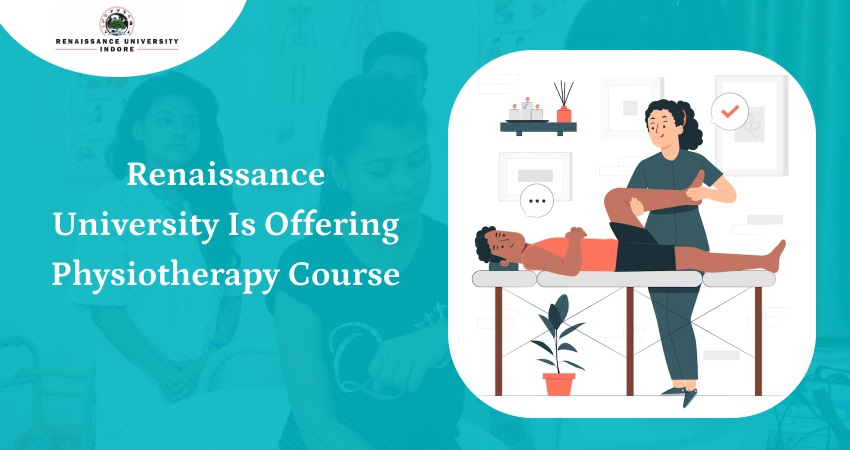Physiotherapy courses are educational programs that teach students the principles and practices of physiotherapy, a type of health care that aims to improve the physical and mental well-being of individuals of all ages. These Types of Physiotherapy Courses typically cover a wide range of topics, including anatomy, physiology, kinesiology, pathology, pharmacology, and rehabilitation techniques.
Physiotherapy is a health profession that has been in existence for more than 200 years. There are many physiotherapy courses available in India. Renaissance university is offering physiotherapy courses.
Physiotherapy is a healthcare profession that deals with the prevention, diagnosis, and treatment of physical and mental health problems in people.
Physiotherapists work with patients of all ages who have injuries or illnesses affecting their muscles, bones, joints, or nervous system. Physiotherapists can also provide services to help improve movement and prevent injury through exercise programs.
Overview Of Physiotherapy Courses
There are several types of physiotherapy courses that can help individuals build successful careers in the field. Some options include:
and the Physiotherapy course in India fees range between INR 1,00,000 – INR 30,00,000.
| Courses | Types of Course | Duration |
Course Fees |
| BPT | Undergraduate Course | 4 years | INR 1,00,000 to INR 5,00,000 |
| BSc Physiotherapy | Undergraduate Course | 3 years | INR 1,00,000 to INR 5,00,000 |
| BOT | Undergraduate Course | 3-5 years | INR 3,00,000 |
| Diploma in Physiotherapy | Undergraduate Course | 2-3 years | INR 10,000 – INR 5,00,000 |
| BVSc | Undergraduate Course | 5 years | INR 7,000 – INR 2,40,000 |
| MPT | Post Graduate Course | 2 years | INR 2,00,000 – INR 7,00,000 |
| MSc Physiotherapy | Post Graduate Course | 2 years | INR 40,000 – INR 3,00,000 |
| MPT (Neurology) | Post Graduate Course | 2 years | INR 30,000 – INR 5,00,000 |
| MD Physiotherapy | Post Graduate Course | 3 years | INR 10,00,000 – INR 25,00,000 |
| MPT (Sports Physiotherapy) | Post Graduate Course | 2 years | INR 2,00,000 – INR 7,00,000 |
| PG Diploma in Sports Physiotherapy | Post Graduate Course | 1 year | — |
| Ph.D. Physiotherapy | Doctorate Course | 2 years | INR 1,00,000 – INR 25,00,000 |
Physiotherapy Eligibility India
To be eligible for a physiotherapy course, individuals typically need to meet the following requirements:
1. Educational qualifications:
Most physiotherapy courses require applicants to have completed high school with a strong academic background in science, including biology and chemistry with 50% to 60%. Some programs may also require applicants to have completed additional prerequisites, such as coursework in anatomy or physiology.
2. Standardized test scores:
Some physiotherapy programs may require applicants to take standardized tests such as the GRE (Graduate Record Examination) or the MCAT (Medical College Admission Test).
Types of Physiotherapy Courses in India

1) Bachelor’s degree in physiotherapy:
A bachelor’s degree in physiotherapy is a four-year program that provides a foundation in the principles and practices of physiotherapy. This degree is typically required for entry into the profession and can prepare students for a wide range of career opportunities.
2) Master’s degree in physiotherapy:
A master’s degree in physiotherapy is a two-year program that builds upon the knowledge and skills acquired in a bachelor’s degree program. This degree can help students specialize in a particular area of physiotherapies, such as sports medicine or geriatric care, and may also provide additional training in research and leadership.
3) Doctor of Physical Therapy (DPT) degree:
A Doctor of Physical Therapy (DPT) degree is a doctoral-level program that focuses on advanced clinical practice and research in physiotherapy. This degree is often preferred by employers and may be required for certain types of advanced practice or leadership roles.
4) Neurological Physiotherapy:
There are several types of physiotherapy courses that focus on the treatment of neurological conditions. These courses typically cover topics such as the principles of neurological rehabilitation, assessment and treatment of neurological impairments, and the use of various techniques and technologies to help individuals with neurological conditions improve their mobility, strength, and overall functioning. Some examples of neurological physiotherapy courses include:
- Introduction to Neurological Physiotherapy
- Advanced Neurological Physiotherapy
- Neurorehabilitation: Principles and Practice
- Neurological Physiotherapy for Children
- Neurological Physiotherapy for Adults
These courses may be offered at the undergraduate or graduate level and may be available at Renaissance universities, colleges, or other institutions that offer physiotherapy training programs.
5) Musculoskeletal physiotherapy –
Musculoskeletal physiotherapy, also known as orthopedic physiotherapy, is a type of physiotherapy that focuses on the treatment of injuries and disorders affecting the musculoskeletal system, which includes the bones, muscles, tendons, ligaments, and other structures that support and move the body. Musculoskeletal physiotherapy courses cover topics such as the assessment and treatment of musculoskeletal injuries and conditions, the use of various techniques and technologies to help individuals improve their mobility and strength, and the management of chronic pain and other long-term musculoskeletal conditions. Some examples of musculoskeletal physiotherapy courses include:
- Introduction to Musculoskeletal Physiotherapy
- Advanced Musculoskeletal Physiotherapy
- Orthopedic Physiotherapy: Principles and Practice
- Musculoskeletal Physiotherapy for Children
- Musculoskeletal Physiotherapy for Adults
These courses may be offered at the undergraduate or graduate level and may be available at universities, colleges, or other institutions that offer physiotherapy training programs.
6) Cardio-thoracic physiotherapy:
Cardio-thoracic physiotherapy is a type of physiotherapy that focuses on the treatment of conditions affecting the cardiovascular and respiratory systems. Cardio-thoracic physiotherapy courses cover topics such as the assessment and treatment of cardiovascular and respiratory conditions, the use of various techniques and technologies to help individuals improve their cardiovascular and respiratory function, and the management of chronic conditions such as asthma and chronic obstructive pulmonary disease (COPD). Some examples of cardio-thoracic physiotherapy courses include:
- Introduction to Cardio-Thoracic Physiotherapy
- Advanced Cardio-Thoracic Physiotherapy
- Cardio-Respiratory Physiotherapy: Principles and Practice
- Cardio-Thoracic Physiotherapy for Children
- Cardio-Thoracic Physiotherapy for Adults
These courses may be offered at the undergraduate or graduate level and may be available at universities, colleges, or other institutions that offer physiotherapy training programs.
7) Physiotherapy in Rehabilitation:
Physiotherapy in rehabilitation is a type of physiotherapy that focuses on the use of various techniques and technologies to help individuals with disabilities or chronic conditions improve their mobility, strength, and overall functioning. Physiotherapy in rehabilitation courses cover topics such as the principles of rehabilitation, the assessment and treatment of impairments and disabilities, and the use of various techniques and technologies to help individuals achieve their rehabilitation goals. Some examples of physiotherapy in rehabilitation courses include:
- Introduction to Physiotherapy in Rehabilitation
- Advanced Physiotherapy in Rehabilitation
- Rehabilitation Physiotherapy: Principles and Practice
- Pediatric Rehabilitation Physiotherapy
- Geriatric Rehabilitation Physiotherapy
These courses may be offered at the undergraduate or graduate level and may be available at universities that offer physiotherapy training programs.
8) Physiotherapy in obstetrics-
Physiotherapy in obstetrics is a type of physiotherapy that focuses on the treatment of conditions related to pregnancy, childbirth, and the postpartum period. Physiotherapy in obstetrics courses cover topics such as the physiological changes that occur during pregnancy, the assessment and treatment of musculoskeletal and other conditions related to pregnancy and childbirth, and the management of conditions such as incontinence and pelvic pain. Some examples of physiotherapy in obstetrics courses include:
- Introduction to Physiotherapy in Obstetrics
- Advanced Physiotherapy in Obstetrics
- Obstetric Physiotherapy: Principles and Practice
- Pelvic Health Physiotherapy
- Incontinence and Pelvic Pain Management in Women
These courses may be offered at the undergraduate or graduate level and may be available at universities, colleges, or other institutions that offer physiotherapy training programs.
9) Sports physiotherapy:
Sports physiotherapy is a type of physiotherapy that focuses on the treatment of injuries and conditions related to sports and physical activity. Sports physiotherapy courses cover topics such as the assessment and treatment of sports-related injuries, the use of various techniques and technologies to help individuals improve their performance and prevent injuries, and the management of chronic conditions such as overuse injuries. Some examples of sports physiotherapy courses include:
- Introduction to Sports Physiotherapy
- Advanced Sports Physiotherapy
- Sports Injury Management: Principles and Practice
- Exercise Prescription for Sports Performance
- Exercise for the Management of Chronic Conditions
These courses may be offered at the undergraduate or graduate level and may be available at universities, colleges, or other institutions that offer physiotherapy training programs.
10) Pediatric physiotherapy:
Pediatric physiotherapy is a type of physiotherapy that focuses on the treatment of conditions and impairments in children. Pediatric physiotherapy courses cover topics such as the principles of pediatric rehabilitation, the assessment and treatment of pediatric impairments and disabilities, and the use of various techniques and technologies to help children improve their mobility, strength, and overall functioning. Some examples of pediatric physiotherapy courses include:
- Introduction to Pediatric Physiotherapy
- Advanced Pediatric Physiotherapy
- Pediatric Rehabilitation: Principles and Practice
- Pediatric Neurological Physiotherapy
- Pediatric Musculoskeletal Physiotherapy
These courses may be offered at the undergraduate or graduate level and may be available at universities, colleges, or other institutions that offer physiotherapy training programs.
Continuing education courses: Many physiotherapists choose to continue their education through a variety of continuing education courses, which can help them stay up-to-date on the latest research and practices in the field. These courses can also help physiotherapists maintain their professional licenses and advance their careers.
Skills Required to Pursue Physiotherapy
There are several skills that can be helpful for individuals interested in pursuing a career in physiotherapy, including:
1. Strong communication skills: As a physiotherapist, you will need to be able to effectively communicate with patients, families, and other healthcare professionals. This includes the ability to listen actively, ask clarifying questions, and explain concepts in an understandable way.
2. Problem-solving skills: Physiotherapists often work with patients who have complex conditions that require creative and customized treatment plans. Strong problem-solving skills can help you come up with effective solutions and make the most of limited resources.
3. Empathy and compassion: As a physiotherapist, you will be working with people who may be in pain or distress, and it is important to be able to show empathy and compassion towards your patients.
4. Physical stamina: Physiotherapy often involves physically demanding tasks, such as moving patients or assisting with exercises. It is important to be in good physical shape and have the stamina to keep up with the demands of the job.
5. Attention to detail: Good attention to detail is important for physiotherapists, as it allows them to accurately assess patients and design effective treatment plans.
6. Adaptability: The needs of patients can change quickly, and it is important for physiotherapists to be able to adapt their treatment plans as needed.
7. Interpersonal skills: Physiotherapists often work as part of a team, and strong interpersonal skills can help you collaborate effectively with colleagues and build positive relationships with patients.
8. Time management skills: Physiotherapists often have busy schedules and may see multiple patients in a single day. Good time management skills can help you stay organized and make the most of your time.
Benefits of Pursue a physiotherapy course
There are many benefits to completing a physiotherapy course, including an improved understanding of the human body, enhanced ability to assess and treat patients, greater job opportunities, and personal and professional development. Physiotherapists are in high demand, and completing a physiotherapy course can open up a wide range of career opportunities in a variety of settings, including hospitals, clinics, and private practices.
Job And Salary After completing the physiotherapy Course
The salary of a physiotherapist can vary depending on a number of factors, including the individual’s level of education and experience, the type of employer, and the location of the job.
In general, physiotherapists with a bachelor’s degree in physiotherapy can expect to earn a starting salary of around 1 lakh to 5 lahks per year. Those with a master’s degree in physiotherapy or a Doctor of Physical Therapy (DPT) degree may earn a higher starting salary, typically in the range of 5Lakhs to 7Lakhs per year.
Experience can also impact a physiotherapist’s salary. Physiotherapists who have been practicing for several years may earn more than those who are just starting out in the field.
The type of employer can also affect a physiotherapist’s salary. Physiotherapists who work in hospitals or large clinics may earn more than those who work in private practices or other settings.
Location is another factor that can impact a physiotherapist’s salary. Physiotherapists who work in urban areas or in regions with a higher cost of living may earn more than those who work in rural areas or regions with a lower cost of living.
Overall, the median annual salary for physiotherapists in the United States is around $88,880, according to the United States Bureau of Labor Statistics. However, it is important to note that this figure can vary widely depending on the factors mentioned above.
Best BPT Colleges
Some of the top BPT colleges are:
- Renaissance University – Established in 2011, Renaissance University offers a range of healthcare programs including BPT. The BPT curriculum includes classroom learning as well as practical clinical training. Some highlights are fully-equipped rehab labs, sports injury center, community training etc. The institute focuses both on theory and applied aspects of physiotherapy.
- Mahatma Gandhi Memorial Medical College – Established in 1972, MGM Medical College is one of the top medical institutes in Central India. The BPT program helps students gain theoretical knowledge and practical skills in physiotherapy. The college is equipped with modern rehab labs, seminar halls, sports injury clinic, etc. for hands-on training.
- Sri Aurobindo Institute of Medical Sciences – SAIMS offers a 4.5 year BPT program that covers areas like manual therapy, biomechanics, electrotherapy, community physiotherapy etc. It has ties ups with renowned hospitals for clinical training of students. The institute also has eminent faculty and trains students in evidence-based practice.
- Index Medical College Hospital and Research Centre – Index Medical College provides a comprehensive BPT program spanning 4.5 years. The college has experienced faculty and partnerships with leading healthcare providers like MY Hospital for internship and hands-on training of students. It also has forums to encourage interest in community physiotherapy.
Conclusion
Physiotherapy courses are good for career progression. This is because they help in the development of skills, knowledge, and experience which are important to a successful career.





